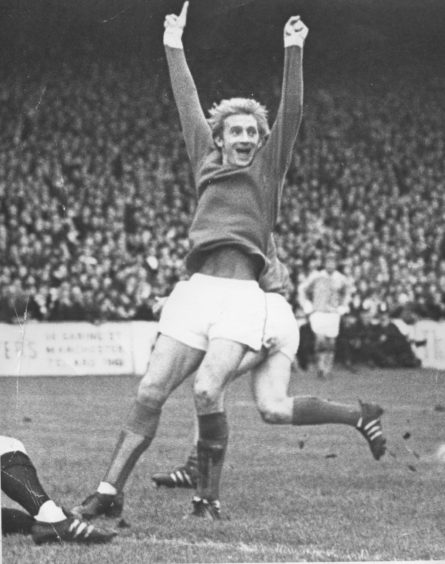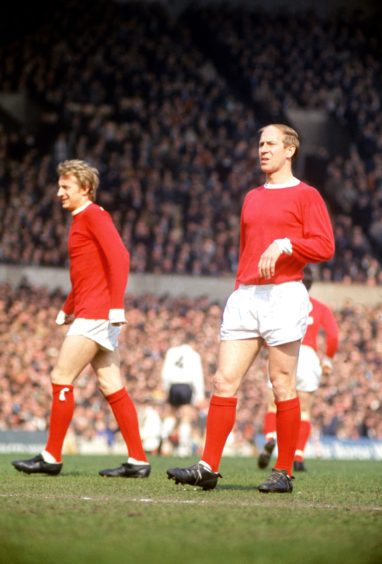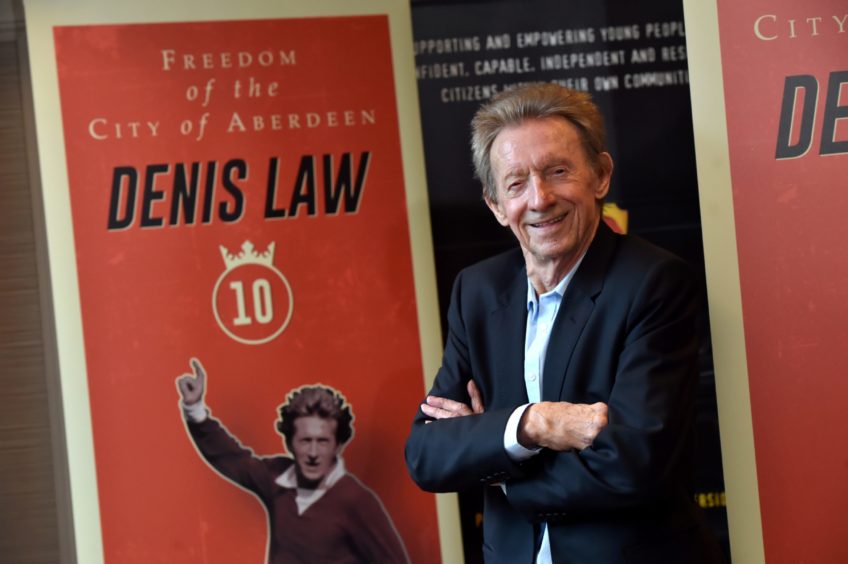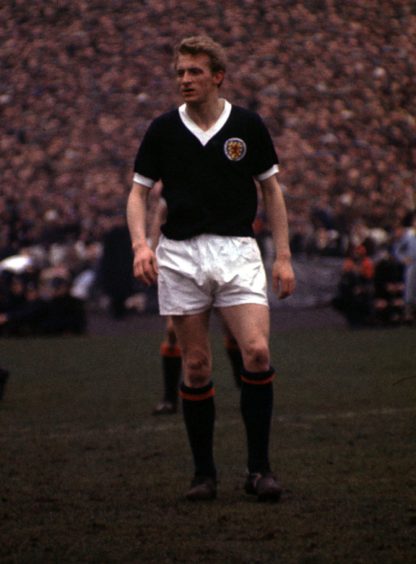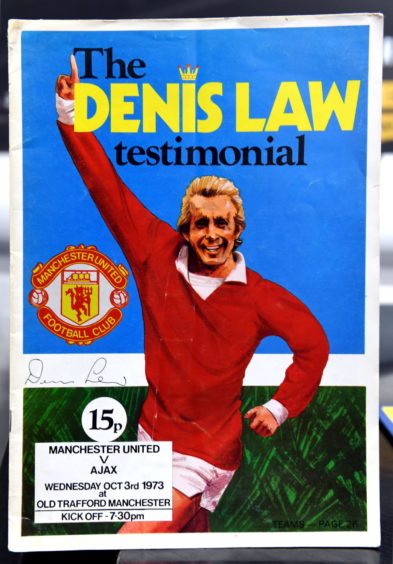It’s hard now to describe the wondrous sense of merriment I experienced as a child when watching Denis Law unveil his bag of tricks on rival defenders who mistook him for a skelf only to discover he was as fragile as an elk.
In those days, the TV pictures were black and white and the Swinging Sixties were winding down at the end of a tumultuous decade, but there was Denis, nonchalantly bewitching, bothering and bewildering opponents, whether in the company of George Best at Old Trafford or Jim Baxter at Hampden Park and Wembley.
These two gifted entertainers are sadly long gone, but we still have The Lawman, Aberdeen’s greatest footballing export, as he prepares to turn 81 next week, and while he has suffered health problems in recent years, let’s raise a toast in his honour.
Denis was the master of all he surveyed
After all, at the height of his powers, this fellow genuinely was a marvellously mischievous sprite who dazzled for Scotland and scored one of the goals when they famously defeated world champions England 3-2 at Wembley in 1967.
He glittered while helping Manchester United become an iconic force who lifted the European Cup a year later against Benfica; and he oozed talent, technical ability and a temperament which steered to him winning Fifa’s prized Ballon d’Or.
The statistics speak for themselves – he amassed 30 goals in 55 Scotland internationals and 237 goals in 404 appearances at Old Trafford and helped the club win the First Division in 1965 and 1967 – but they never told the full story.
A force for good on and off the football pitch
I once spoke to the late Ferenc Puskas about the players he had most admired during his glorious, trophy-strewn career at Real Madrid. He reeled off a few stellar names such as Alfredo di Stefano and Pele, much as you would have expected.
But then, he positively purred as he sang the praises of Baxter – “He was a showman and a kindred spirit” – and Law – “When I first saw him, he looked like a ball boy or at least until you gave him the ball and let him run with it.
“Once he was out there on the pitch, he was a brilliant player who could have travelled anywhere in the world and he would have been a superstar.”
‘For the first time in my life, I had confidence’
The words testified to the fashion in which the skinny wee lad from 6 Printfield Terrace in Woodside shrugged aside such issues as growing up with a squint and being branded “Cockeye” by the other children when he took part in school games.
Eventually, years later, the problem was rectified and Law described it as something which “completely changed things”.
“Suddenly, I could look people straight in the eye,” he said.
With typical self-deprecating candour, he added: “I knew that I wasn’t the best-looking man on the block, I knew I had too big a nose and all the rest, but it didn’t make any difference to me. Because, for the first time in my life, I had confidence.”
A recent documentary film on Sky attempted to analyse the remarkable story of this far-travelled football luminary. Sadly, it was all a bit po-faced and prosaic and captured little of the sheer joie de vivre which the Scot brought to the game.
Denis is still in love with family and football
Because, whether in refusing to celebrate his goal which helped consign United to relegation after he moved to their great rivals, Manchester City in the 1970s, or in his obvious delight at performing alongside such transcendent figures as Best and Charlton, there is a decency, dignity and sense of derring-do stamped in his DNA.
I’ve discovered that many former players become curmudgeonly types, forever insisting that the game has gone downhill since they packed away their boots. But Law has never been one to dwell in the past or cling to the belief he was something special.
Instead, he has established the Denis Law Legacy Trust, been involved in championing the creation of two Cruyff Court facilities in his home city, has backed such causes as getting “No Ball Games” signs removed from communal areas and has worked tirelessly to promote the benefits of sport in boosting health and tackling anti-social problems.
He was made a CBE and accorded the Freedom of Aberdeen in 2017 – the first person to receive the accolade since the Scotland the What? trio in 2008 and only the second since since another Old Trafford legend Sir Alex Ferguson was honoured in 1999.
And, every November, or at least until the Covid outbreak, he meets with former teammates to reminisce about that hallowed win at Wembley 54 years ago.
He still relishes these trips back to his roots, but has never glossed over the contrasting fortunes which he experienced against England in 1961 and 1967.
If the latter was a Hollywood movie, the former was an X-rated video nasty.
T’was the nightmare of April 1961
There was no glossing over the sheer calamity which befell the Scots when they met the Auld Enemy at Wembley on April 15 1961.
Even now, 60 years on, the scoreline England 9 Scotland 3 sounds like it should be accompanied by smelling salts for those of a nervous disposition.
It was Denis’ blackest day, but he can still – just about – laugh at the craziness of it all. As he recalled: “Bobby Robson opened the scoring and they were leading 3-0, but we fought back to 3-2 with goals from Dave Mackay and Davie Wilson.
“England were rocking for a wee while, but then we conceded a stupid fourth from a free kick, we were, to say the least, dodgy at the back with [goalkeeper] Frank Haffey having a nightmare, and they just ran away with it to our embarrassment.
“Can you imagine being in a Scotland team that has been beaten 9-3? It might be just about acceptable in a schoolboy game, maybe even in a club match, but certainly not in an international and most definitely not at Wembley.
“For the rest of our careers, that result made all the Scottish players all the more determined on the pitch, because we continually had to try to live it down.”
Causing alleged offence to Her Majesty
At least, the home-based Scots could scuttle back to Caledonia with their tails between their legs. But Law had to stay in Manchester where he was ribbed mercilessly and even found himself dragged into an early example of ‘fake news’.
Or, to put it another way, he lashed out at another player in front of the Queen; a shocking act of lese-majeste which incurred the wrath of some newspapers.
He explained: “The television cameras caught me being a naughty boy right underneath the Royal box. Bobby Robson kicked me and so I kicked him back.
“Fortunately, we shook hands and apologised to one another. But one of the papers made a big play of what had happened, stating: ‘Law had the audacity to kick Bobby Robson right on the centre circle in front of the Queen’.
“I was immediately dropped after the game, along with poor Frank Haffey,” he recalled.
“But I was annoyed at being singled out among the forward. I mean, we had scored three goals against the English in London, which would have been enough to win a normal game.
“But if anybody was going to carry the can, I thought it would be an Anglo.”
Redemption arrived six years later for Denis
By the time the Scots arrived in London in 1967, they knew they were facing the newly-crowned world champions. Nobody gave them a chance: they were ritual lambs being led to the inevitable slaughter against Alf Ramsey’s side.
Yet the script, in many ways, was perfect for Denis Law, Jim Baxter, John Greig and co, and they collaborated in one of the biggest shocks in football history with a wonderful spirit of derring-do and dexterity while beating the hosts 3-2.
One might imagine that Denis would have been thrilled at the outcome, especially since he opened the scoring, but although the contest is remembered by many fans for Baxter’s keepie-uppie in the closing stages, not everybody was impressed.
As Law said: “When we were 3-1 ahead, instead of hammering home our advantage, we let them off the hook, with Jim and others playing to the crowd.
“That almost let England back into the game when we still had something to spare. It was a good victory, but I think it could have been better.
“Looking back, I think we paid too much attention to these England matches. Treating that 1967 game as as unofficial World Cup final was unprofessional, really.
“If our approach had been a bit more disciplined, I think we could have done a lot better than we did in competitive football.”
Even after all these years, this redoubtable character still has the attitude that genius is an overused word and should only be reserved for the true greats in any sport.
But few of us would hesitate to use the term in connection with Denis Law.

